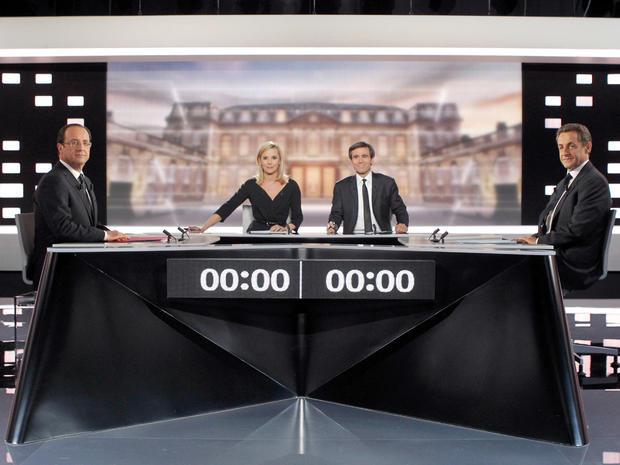French President Nicolas Sarkozy fails to deliver knockout blow in debate against Francois Hollande
(CBS News) PARIS - Like a fighter down on points in the late rounds, Nicolas Sarkozy had to come out swinging.
According to the generally accepted wisdom in France, a knockout, or at least a TKO, was the only chance Sarkozy had in Wednesday night's sole presidential debate. He trails his opponent, Francois Hollande, in the opinion polls by a greater margin than has ever been overcome in the two-week gap between the first and second rounds of a French presidential election.
The decisive vote, where the two leading candidates from the first round of voting face off head to head, is Sunday. Without a body on the canvas to stand over, "Sarko" is starting to look like French toast.
French activist drops a smoke bomb on nuclear plant
Sarkozy to woo far-right to try to win re-election
Fringes loom large in French presidential election
But Sarkozy has a reputation as a scrapper. He's a small, Napoleonic figure and where better to have that appreciated than in France? In the last election five years ago, he so unsettled his opponent, Segolene Royal, that she became visibly rattled. It's OK to be angry, she said. It wasn't, and she lost.
Hollande, who was Royal's partner at the time (they've since parted ways), has a reputation as a political back room boy. He's never held significant public office and is seen as a creature of the un-reconstructed left wing of French politics.
But if Sarkozy thought he could jab Hollande into submission the way he had Royal, he was wrong. Hollande put up more than a feisty defence. He attacked. The debate became nasty with each of the fighters accusing the other of telling lies and of arrogance.
The fight went on for almost three hours and was broadcast on France's two biggest TV networks. Fully a third of the country was tuned in. Occasionally, the argument got bogged down in a battle of statistics -- whether the French national debt is 500 million or 600 million euros, for example.
In the bar in which I was taking the nation's temperature, the statistical stalemate was an opportunity for customers to order another glass of whatever they were drinking. But in the frequent flurries of bitter, personal insult, the bar crowd began cheering as if they were watching a soccer game.
As is often the case, the debate seemed to consolidate support the candidates already had rather than win over new voters. For Sarkozy to stand a chance, he has to convince a large majority of those who voted for the far-right National Front party in the first round to hold their noses and vote for him this time.
But as their leader, Marine Le Pen, has refused to support either mainstream party -- she says she'll cast a blank ballot -- it's thought unlikely that enough Le Pen supporters will swing behind Sarkozy to make a difference.
Le Pen seems to be taking the long view. She says she'll stomach a Socialist president now because she sees no real difference between Hollande and Sarkozy and because she'd like nothing better than to see Sarkozy's center-right UMP, or Union for a Popular Movement, party crushed so that she can rush in from the right and fill the vacuum.
The likely victory of Hollande on Sunday has made other European governments nervous, particularly Germany. Sarkozy and German Chancellor Angela Merkel were the joint driving force behind the austerity deal that staved off the Greek economic collapse (at least temporarily) and shored up Italy and Spain.
But Hollande is from the classic tax-and-spend school of leftish European politics. He's promised to create 60,000 new public service jobs. His election would produce a new tension in Europe between spenders and cost-cutters. And if the markets hate anything, they hate uncertainty.
An unstable eurozone would be a major bump in the road toward an American recovery as well. This election will have consequences everywhere.
After the debate, Sarkozy promised to fight on till the end. And more and more there is a sense here that the end is coming.

